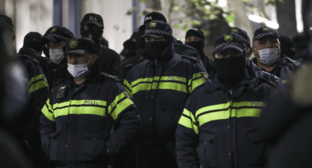10 September 2008, 22:14
The Frankfurter Allgemeine Zeitung: Georgian Joint Staff was against invading South Ossetia
Commanders of Georgian military forces have reported at the Brussels NATO Headquarters that they were against the military invasion into South Ossetia. They assert that should they have been given a chance, they would have persuaded President Mikhail Saakashvili not to invade.
They had thought that the Georgian troops could have done with South-Ossetian army and militia, but were predictably helpless against Russia.
The German newspaper The Frankfurter Allgemeine Zeitung writes about it.
The versions presented by Saakashvili and the generals about the start of warfare are quite different, the edition writes.
In Mr Saakashvili's version, the start of military actions was a reaction to South-Ossetian provocations and a direct threat of Russian invasion.
Allegedly, Georgia possessed reliable information that "Russians had already passed through the Rokskiy Tunnel," and, therefore, had rushed into South Ossetia. In this case the Alliance could have regarded the Georgian aggression as a defence under necessity.
In the report of the Georgian Joint Staff, the Rokskiy Tunnel version got a different interpretation. The Georgian generals have reported to the NATO Headquarters that their armed forces had considered a variant of blowing up the Tunnel, however, they (the generals) gave up the idea, since South-Ossetian refugees were already moving through the Tunnel.
The NATO diplomats suspect, the newspaper writes, that "the utterances of the Joint Staff are, possibly, the generals' attempt to 'keep their hands clean' and impose the whole guilt for the lost war on Saakashvili."
Meanwhile, the Alliance already has, they assert in Brussels, a complete picture of the course and results for the Georgian party of the warfare in the Caucasus. Not only from the report of the Georgian Joint Staff, but also from the reconnaissance data of the Alliance member-states, and of the NATO itself.
The data gathered by the NATO confirm that the Georgian armed forces started the operation at night of August 8 aiming to seize South Ossetia. By that time, the total strength of the Georgian army made 10,000 soldiers, but one brigade was in Iraq.
Brigades 3 and 4 had entered Tskhinvali supported by the artillery, while Brigade 2 was in reserve. They quickly captured the city and started moving towards the Rokskiy Tunnel.
The forces of the 58th Russian Army, 8000 strong, were in North Ossetia. They had just returned from their routine manoeuvres. In the opinion of NATO's experts this gave them a priority, as the military machines were ready to march, filled up with fuel and charged with ammunition.
Russian troops had passed through the Tunnel, the Brussel's NATO experts explain, and quickly defeated Georgian Brigade 3. Its soldiers ran away having abandoned their heavy armoury, while Brigade 4 retreated in the direction of Gori.
As early as August 8, Russians reached Tskhinvali. But at night of August 9, Georgians made a counter-attack attempt. On August 9, with American assistance, Brigade 1 was brought back from Iraq, but this was no help. Possessing huge dominance in the air, Russian Air Forces had destroyed all 12 Georgian bombers still on the ground.
All the ships of the Georgian Marine Forces were drowned. According to the NATO, in total, 198 Georgian soldiers were lost, 1700 wounded and 5000 dispersed.
The same experts now remind that Georgia had received 180 million US dollars of military aid from the USA, and 90 million more from Turkey; this money was spent to buy armaments, mainly in Ukraine. However, most of them were liquidated.
In this context, The Frankfurter Allgemeine Zeitung presents the opinion of NATO's military experts that the Georgian Army today "is of minimum combat value."




